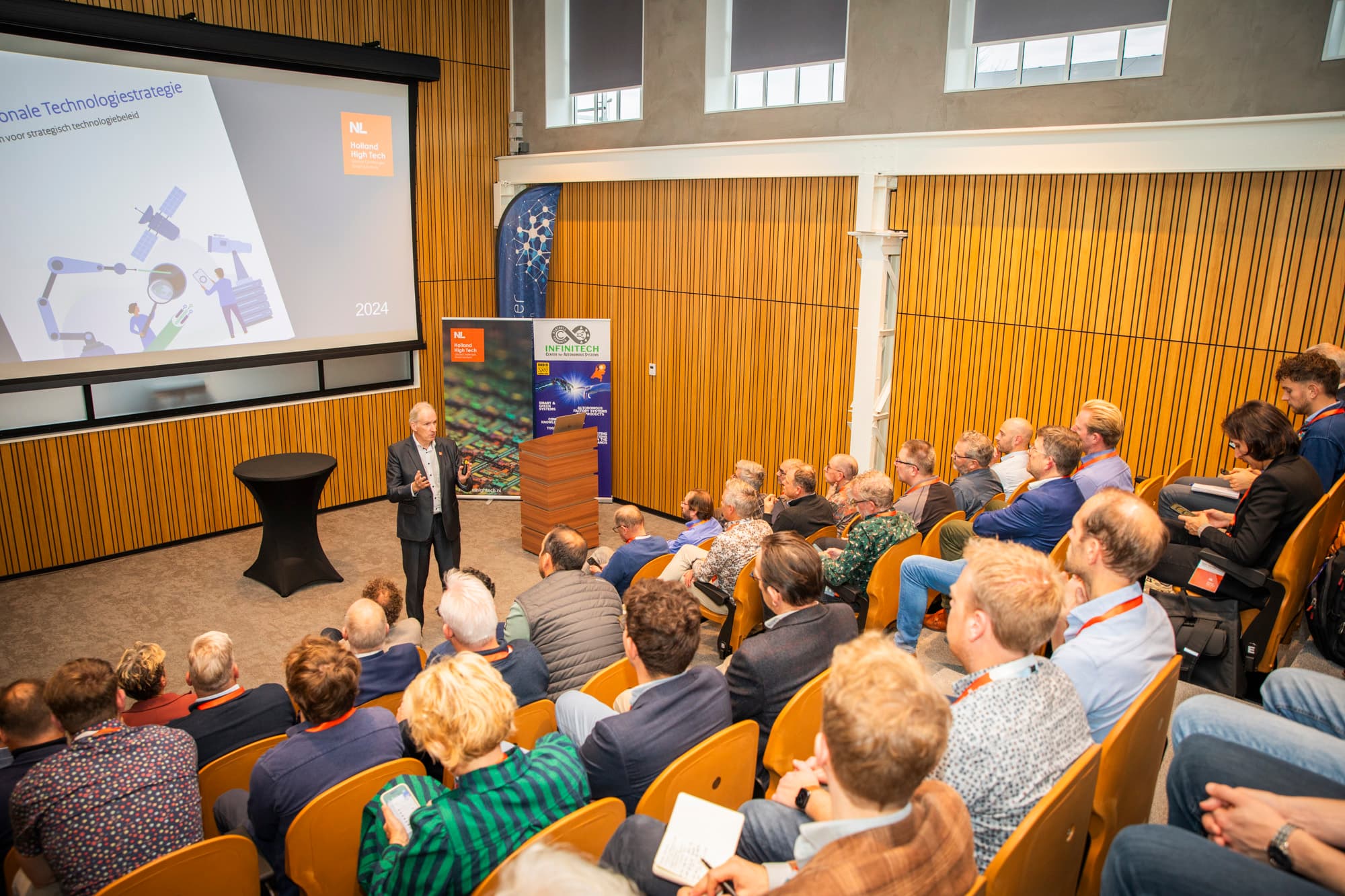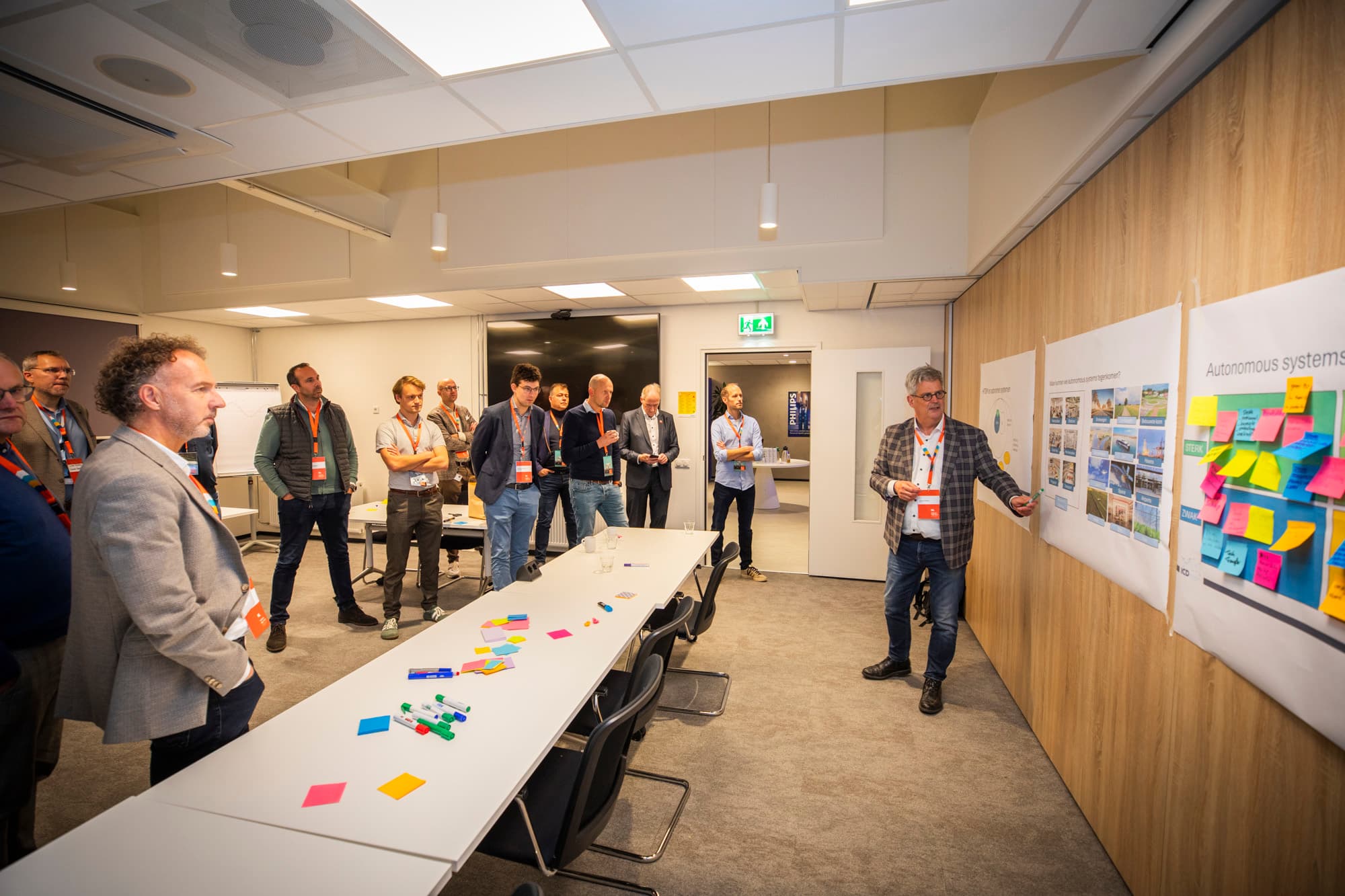An autonomous industry: how the Netherlands remains competitive
During a Holland High Tech innovation session on smart industry, experts from companies, institutions, and the government gathered.
Published on November 13, 2025

Leo Warmerdam during the Holland High Tech event on Smart Industry
Our DATA+ expert and Editor-in-Chief, Elcke Vels, explores AI, cyber security, and Dutch innovation. Her "What if..." column imagines bold scenarios beyond the norm.
In China, autonomous factories are springing up like mushrooms. The Netherlands is not quite there yet, but important steps are being taken within its borders. During a Holland High Tech innovation session on smart industry, experts from companies, knowledge institutions, and government agencies gathered in Drachten. They discussed how autonomous production systems will shape the manufacturing industry of tomorrow and provided input for the innovation roadmaps of the near future. “It is essential that we now specify the steps needed to produce smarter,” emphasizes Leo Warmerdam, managing director of Holland High Tech.
In the manufacturing industry, you increasingly hear the term “dark factory”: a factory where no people are walking around, no lights are on, and everything runs automatically all the time. A place where robots, autonomous machines, and software take over the work.
It sounds futuristic, but this scenario is already a reality. Dark factories are in full swing in China. For example, Xiaomi's AI factory produces one smartphone per second completely autonomously. The Netherlands is also taking cautious steps in this direction, as was evident from the various presentations during the innovation session. This was organized by Holland High Tech, in collaboration with the NOM, Horizon, Innovation Cluster Drachten (ICD), and other partners. It was an afternoon packed with concrete tools and insights for further automating the manufacturing industry. It wasn't just presentations with slides. Attendees were treated to a live demonstration of 4NE1: a humanoid robot from Neura Robotics, specially developed for industrial processes. In addition, attendees provided valuable input in breakout sessions for innovation roadmaps that will further shape the ecosystem.
The power of the Northern Netherlands
The afternoon was kicked off by Ronald van Es, program manager at Holland High Tech. He welcomed the participants and explained the program. Joost Krebbekx, program manager of Innovation Cluster Drachten, then outlined the power of the North when it comes to making the Dutch manufacturing industry future-proof. “We're showing off our peacock feathers,” he said (laughs). Krebbekx highlighted living tech legends from the North, such as Bluetooth inventor Jaap Haartsen. He also mentioned examples of leading manufacturing companies from the North. “The region is home to some impressive flagship factories. In 2007, Scania opened a location in Meppel, specializing in plastic parts for truck assemblies. Philips Drachten is one of Philips' largest development and production centers in Europe.”
A rich history, then. André Harmens, from the NOM, expects the North's high-tech industry to receive a significant boost in the coming years. “The new AI Factory in the former Niemeyer tobacco factory in Groningen promises to become the heart of AI innovation in the Netherlands. Here, models can be trained and knowledge built up, completely independently of American parties, thanks to our own hardware.”
There is no lack of ambition in the Northern Netherlands. Krebbekx: “The Northern Netherlands wants to become one of the four leading high-tech regions in the country. Autonomous factories are part of that.”
Holland High Tech: a connecting factor
Leo Warmerdam, director of Holland High Tech, then took the floor. He began with a clear message: urgency is required if the Netherlands is to remain competitive. “It is essential that we now specify the steps needed to produce more intelligently.”
Warmerdam emphasized the role of Holland High Tech as a connecting link in the Dutch high-tech ecosystem and how the top sector links initiatives to the National Technology Strategy. Holland High Tech has an entire innovation domain dedicated to Smart Industry.
With thirteen strategic programs and a total budget of €131 million, Holland High Tech stimulates the high-tech sector and the associated innovations that are useful in autonomous factories. Warmerdam announced that a number of new calls will be opened in the first quarter of 2026. For example, the NWO HTSM call will start in Q1 2026, with an emphasis on quantum and smart materials, among other things. Two SME calls will also start on January 5, one for high-tech and one in collaboration with the Ministry of Defense. So there will be plenty of innovation stimulation.
The director is also looking forward to a meeting on January 26 in which Holland High Tech will take the lead. The 10 new Action Agendas will be presented, based on the 10 priority key technologies of the National Technology Strategy. “The objectives for 2035 will be translated into the concrete steps that are needed in the coming years.”
Autonomous factories in the Netherlands: how far have we come?
Warmerdam handed over to Jeroen Broekhuijsen, CTO Smart Industry at TNO. Broekhuijsen outlined a major challenge for the Dutch manufacturing industry: it is almost impossible to find personnel. “Staff shortages, declining productivity, and the need for sustainability are putting pressure on factories, machine companies, and software companies.”
According to him, digitization and automation are part of the solution. He emphasizes that there is still much room for improvement in this area in the Netherlands. At the same time, many companies within the country's borders are already demonstrating what is possible. “Auping has developed a new, largely robotized production line for circular mattresses.” In the northern Netherlands, RODIN Machining is also taking a smart approach, he says: “Five existing factories are gradually being brought together into one new, fully automated factory. This allows processes to be optimized without completely shutting down the existing organization.”
Erik Koehorst, program manager for PPP projects at Philips Drachten, explained how the company has been committed to autonomous systems for decades. “75 years ago, we started mass production of modern electric shavers.” At the time, this was a crucial step towards automation. Philips has made enormous progress since then. A striking example is the autonomous painting line, “where the painting process is fully automated, while employees feed the products and perform visual inspections. In this way, Philips combines advanced automation with human expertise.”
Koehorst emphasized the importance of collaboration. He cites Infinitech as an example: an initiative of tech companies in the northern Netherlands, supported by the NOM, in which industry and knowledge institutions jointly develop products and systems to accelerate innovation in autonomous systems. “Together, we can go a long way.”
Participants share experiences and ideas
The presentations were followed by three breakout sessions in which participants exchanged experiences and ideas about smart industry. The first session focused on innovations in autonomous factories. Quality monitoring, digital twins, and cybersecurity were discussed, as well as the human side of innovation: how organizations can better implement new technologies. The second session focused on applying existing technologies to take steps toward autonomy today. Here, it was emphasized that social innovation is at least as important as technical ingenuity. The third session focused on the Northern Netherlands region: what are its strengths, and where are the challenges? The region has strong assets such as universities, data centers, and high-tech companies, but also faces challenges such as staff shortages. The session also highlighted an untapped opportunity for the North: stronger cooperation with other regions.

A break-out session during the Holland High Tech event about Smart Industry
The sessions provided input that will be used to shape various innovation agendas: Holland High Tech's Smart Industry agenda, the Northern Netherlands roadmap, and the NWA Smart Industry route. “The shared ideas and experiences will be used for the further development of the region and the sector,” concludes Warmerdam.
Sponsored
This story is the result of a collaboration between Holland High Tech and our editorial team. IO+ is an independent journalism platform that carefully chooses its partners and only cooperates with companies and institutions that share our mission: spreading the story of innovation. This way we can offer our readers valuable stories that are created according to journalistic guidelines.
Want to know more about how IO+ works with other companies? Click here
